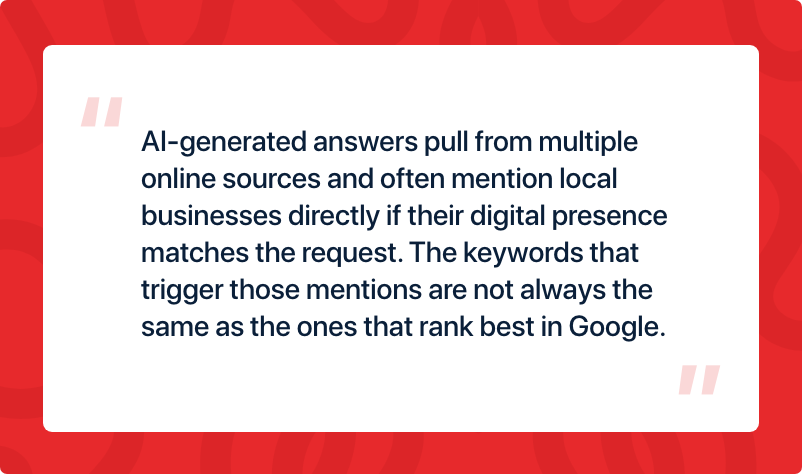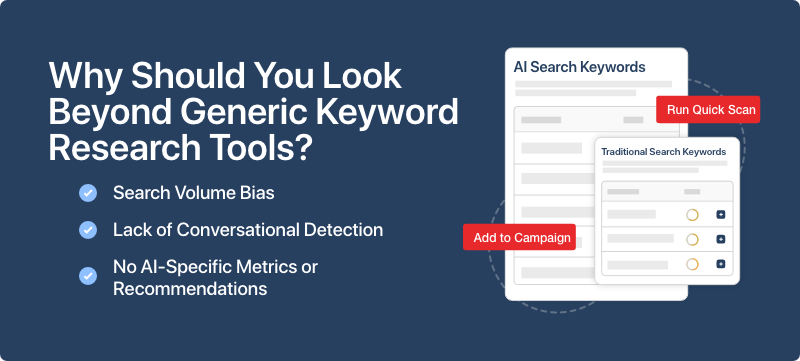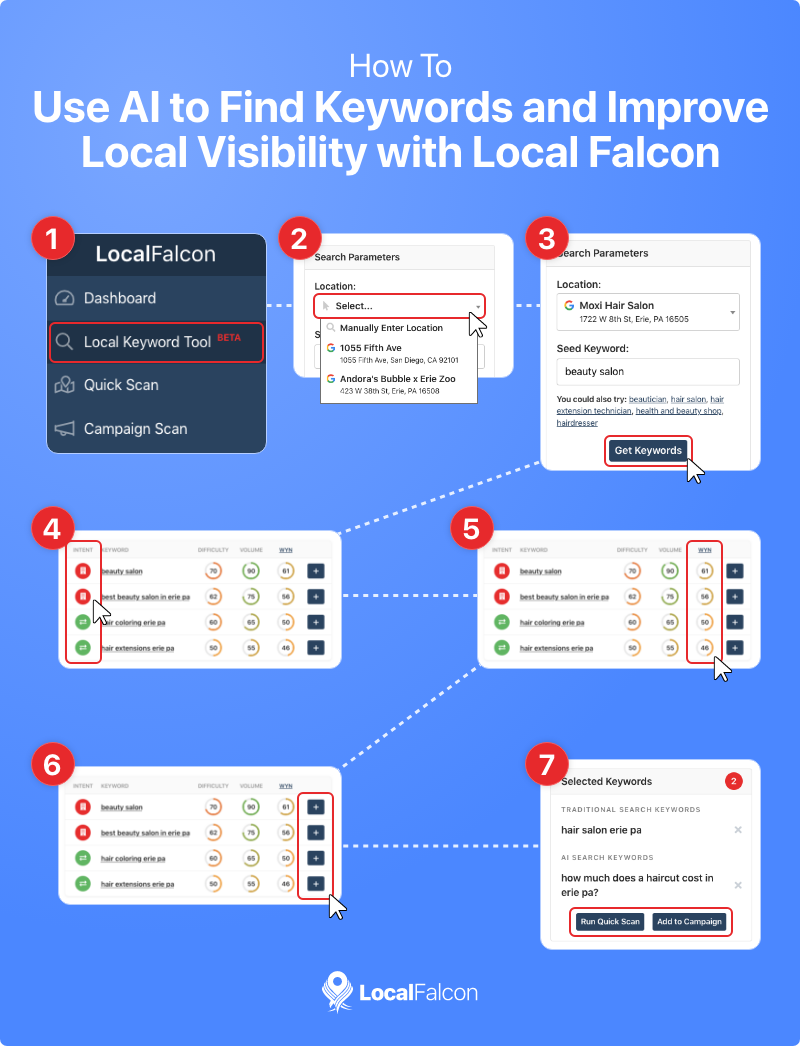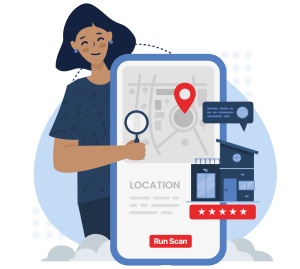The way people search is changing, and local SEO is no longer just about ranking on Google. AI-generated answers, via platforms like ChatGPT, Google AI Overviews, AI Mode, and Gemini, are becoming a part of everyday local search behavior.
In order to ensure local visibility across both traditional search engines and AI tools, businesses and local SEO professionals need to do both traditional and AI keyword research, building targeted keyword lists of general terms as well as longer, more conversational search queries that people use to prompt AI.
The challenge is that most keyword tools only find traditional search terms based on national search volume, ignoring localized AI discovery terms that might have low search volume in traditional search, but are likely to trigger a business mention in an AI-generated answer for a specific area.
Local Falcon's Local Keyword Tool bridges both worlds, offering users a way to not only simultaneously discover keywords for traditional and AI search, but also evaluate their potential worth beyond search volume; through AI reasoning, search intent labeling, and a proprietary Weighted Yield Number (WYN) score.
Why AI Keyword Research Matters for Local SEO
The term AI keyword finder isn't just a new label for an old tool. It's an important next step in keyword research.
For years, keyword research has focused almost exclusively on ranking in search engines like Google or Bing. The process was simple: plug in a seed keyword, get a list of related terms, check search volume and competition, and select the ones to target. That approach is still relevant, but it is no longer everything.
AI tools are now a solidified part of search experiences, which means some users may never see a traditional list of blue links.
AI-generated answers pull from multiple online sources and often mention local businesses directly if their digital presence matches the request. The keywords that trigger those mentions are not always the same as the ones that rank best in Google.
Here's an example:
- Traditional keyword: "Toronto plumber"
- AI prompt keyword: "Who is the most reliable emergency plumber near Queen Street in Toronto?"
The second phrase might not appear in traditional volume-based keyword research reports, but it could be a valuable trigger for an AI-generated answer that mentions your business.

Why You Need an AI Keyword Tool for SEO Research
In order to uncover these AI-focused keyword opportunities, you need to look beyond generic keyword research tools. Here's why:
- Search volume bias: Most tools are designed for Google SEO, so they prioritize keywords with measurable traditional search volume. AI-style prompts rarely appear here.
- Lack of conversational detection: Few tools can identify the natural language queries that are common in AI searches.
- No AI-specific metrics or recommendations: Without factoring in AI discovery potential, it is difficult to look beyond traditional search keywords.
These limitations create a competitive opportunity for businesses that adopt AI keyword research early: they can target keywords that their competitors do not yet know exist, boosting local AI visibility now and helping to future-proof their local SEO strategies.

How Local Falcon's Local Keyword Tool Bridges the Gap
Local Falcon's Local Keyword Tool is built for this new reality. It is both an AI keyword generator and a complete AI keyword tool for SEO research that looks at traditional search terms and AI discovery prompts together.
1. AI-Powered Keyword Discovery
The Local Keyword Tool uses traditional keyword metrics (volume and difficulty) alongside AI reasoning to surface high-value keywords for Google, Bing, and leading AI platforms. You get:
- Shorter, higher-volume keywords for traditional local SEO.
- Longer, more conversational phrases for optimizing local AI visibility.
The AI reasoning even highlights specific local relevance, including market trends or seasonality, providing additional context around why you might want to target a specific term, beyond its volume and difficulty.
2. Search Intent Labeling
Each keyword suggestion is tagged with its most likely intent: informational, commercial, navigational, or transactional. Understanding search intent helps you create the right type of content for each stage of the customer journey.
- Informational and commercial keywords are often used when people are researching options or comparing providers.
- Navigational and transactional keywords appear when people are looking for a specific business or are ready to make a purchase.
When you know the intent behind each keyword, you can balance your strategy to attract searchers at every stage of the buying journey, whether they're engaging with traditional search engines or AI-powered tools.
3. WYN Score
Keyword search volume is still an important metric for keyword research, but broad search volume alone doesn't tell the whole story. The WYN score factors in:
- Localized search volume
- Competitive difficulty (factoring in number of local competitors and population)
- Commercial intent
This score allows you to see at a glance which keywords deserve the most attention.
Real-World Example: Finding AI Search Keywords for a Coffee Shop
Imagine you run a coffee shop in Chicago's Wicker Park neighborhood.
A traditional search keyword list might include terms like:
- "coffee shop wicker park"
- "best coffee chicago"
- "cappuccino near me"
While an AI search keyword list might include phrases like:
- "where can I get oat milk lattes in wicker park"
- "find me a coffee shop near the 606 trail with outdoor seating"
- "what's best cafe to work from in wicker park open past 8 pm"
In traditional keyword tools, these AI-style phrases are likely to show little to no measurable volume. However, they can still be powerful visibility triggers for AI assistants or AI Overviews.
If your online presence matches the description of what a user is looking for and you have optimized for it, your business could be named directly in the AI's answer.
How To Use AI to Find Keywords and Improve Local Visibility with Local Falcon
Getting started with Local Falcon's AI-powered Local Keyword Tool is straightforward:
- Open up the Local Keyword Tool in your account Dashboard.
- Choose a business location from your saved locations or type in any location (city, neighborhood, postal code, etc.).
- Run the AI keyword finder to generate lists of traditional and AI-style keyword suggestions.
- Review search intent labels: Focus on terms that align with your goals, such as transactional for immediate sales or informational for AI discovery.
- Check the WYN score: Start with high-WYN keywords that offer strong opportunity with manageable competition.
- Build a keyword list: Select the most relevant keywords from both your traditional and AI-style results (keep in mind that you can keep entering new seed keywords and generating new recommendations without losing your keyword selections).
- Run a Quick Scan or set up a Campaign to track rankings for the keywords: Use Local Falcon's rank tracking to see how your business performs for each keyword across the map of your service area, monitoring both traditional search rankings and AI search visibility.
- Apply keywords in your local SEO strategy: Update your website content, business listings, and structured data to improve local search performance across traditional search and AI.

Frequently Asked Questions
What is an AI keyword finder?
An AI keyword finder is a tool that helps identify keywords people use in both traditional search engines and AI-powered search platforms. It includes conversational prompts and long-tail queries that may not appear in volume-based keyword research but can still drive visibility in AI-generated answers.
Why do I need to find AI-specific keywords?
AI-specific keywords often reflect how people naturally phrase questions to AI assistants, which differs from short, generic search terms. Targeting these can increase your chances of being mentioned in AI results, expanding your reach beyond traditional Google rankings.
How is AI keyword research different from traditional keyword research?
Traditional keyword research focuses on high-volume search terms for Google or Bing, while AI keyword research also looks at conversational prompts and niche queries used in AI tools. The goal is to capture opportunities where competitors may not yet be optimizing.
How can Local Falcon help with AI keyword research?
Local Falcon's Local Keyword Tool combines traditional keyword metrics with AI reasoning, search intent labels, and the proprietary WYN score. This helps you identify, prioritize, and track keywords that can drive both search engine rankings and AI-based visibility.
Conclusion
Staying visible in both traditional search and AI-generated answers means expanding your keyword strategy. With Local Falcon's Local Keyword Tool, you can uncover the full spectrum of terms your customers are using, prioritize them with data-driven insights, and track your visibility across every channel that matters.


